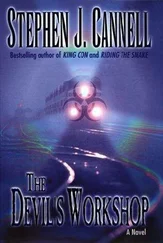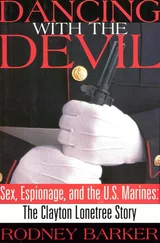Алан Джадд - The Devil's Own Work
Здесь есть возможность читать онлайн «Алан Джадд - The Devil's Own Work» весь текст электронной книги совершенно бесплатно (целиком полную версию без сокращений). В некоторых случаях можно слушать аудио, скачать через торрент в формате fb2 и присутствует краткое содержание. Жанр: sf_mystic, на английском языке. Описание произведения, (предисловие) а так же отзывы посетителей доступны на портале библиотеки ЛибКат.
- Название:The Devil's Own Work
- Автор:
- Жанр:
- Год:неизвестен
- ISBN:нет данных
- Рейтинг книги:3 / 5. Голосов: 1
-
Избранное:Добавить в избранное
- Отзывы:
-
Ваша оценка:
- 60
- 1
- 2
- 3
- 4
- 5
The Devil's Own Work: краткое содержание, описание и аннотация
Предлагаем к чтению аннотацию, описание, краткое содержание или предисловие (зависит от того, что написал сам автор книги «The Devil's Own Work»). Если вы не нашли необходимую информацию о книге — напишите в комментариях, мы постараемся отыскать её.
The Devil's Own Work — читать онлайн бесплатно полную книгу (весь текст) целиком
Ниже представлен текст книги, разбитый по страницам. Система сохранения места последней прочитанной страницы, позволяет с удобством читать онлайн бесплатно книгу «The Devil's Own Work», без необходимости каждый раз заново искать на чём Вы остановились. Поставьте закладку, и сможете в любой момент перейти на страницу, на которой закончили чтение.
Интервал:
Закладка:
Yet he was very tidy and the flat was almost eerily clean. It was in a tall terraced house with a forbidding exterior and gloomy, unkempt common parts. He was on the ground floor and his main room overlooked the street. He had his desk facing the window, which he claimed not to find distracting because so little went on in the quiet street. I used to wonder whether it was really so that he could save on electricity, which is what the reason would have been in my case. The room itself was not at all how I had expected a writer's room to be. Where one gets these ideas, I don't know, but I remember expecting to find it littered with old books and pipes — though Edward did not then smoke — and furnished with worn leather armchairs, a large old desk, an open fire, an old-fashioned standard-lamp and some bit of exotica such as a skull or a parrot. Instead of which, the room was clinically white with a fitted beige carpet and adjustable metal bookshelves filled with new books. It was furnished with one metal-framed upright armchair, a desk and chair of the modern office sort, a small filing cabinet, a flexible table-lamp and two radiators. The fireplace was covered and there were no paintings. I never knew Edward to show any interest in music — except during a brief late period but that was not for the sake of the music — nor in painting, and he was never in the least discomforted by lack of decoration. I like to clutter a room. I fill space wherever I see it but he either didn't notice or used positively to relish the emptiness. No doubt that added to the impression it gave of being a cold room. It was a cold that had nothing to do with temperature. A kind of patient, calculated waiting.
It was in that room that it started, at least as far as I was concerned, although the origins were far away. I have tried to remember whether Edward gave any sign of having an inkling, whether he was, in fact, waiting; but I can recall nothing except one remark he made and that may have been coincidental. It was after he had turned down the television script and I had taxed him with neglect of his career. He swivelled in his typist's chair to face me and smiled his small smile. The light was behind him and half his face was in shadow.
'I don't think my career is something I need pursue,' he said. 'It's more a question of patience and recognition, of seizing the moment. Then it will pursue me.'
That remained in my mind but it was only much later that I discovered I had remembered it. Edward had the reputation of being a brilliant talker yet he was far from voluble and I remember little of what he actually said. Others, I know, have found the same and it contributes to the increasingly unreal impression left by his career and reputation, an impression that affects even me. Conversely, I can always recall the exact timbre of his voice, the quiet and precise enunciation that lent such gravity to what he said that even when he used the same words as someone else they seemed to mean more. I don't know that he really was wittier than other people but the way he spoke made it seem so. It was as if he put his words in inverted commas and so detached himself from them, reserving his position. I would tell others of Edward's humour, yet I rarely laughed in his company, and he almost never in mine.
His remark about his career I interpreted as meaning: hat it was a question of seeing and seizing the moment in. artistic terms. He published his first novel soon afterwards. and I remember he spoke about it as the time drew near. Normally he adhered to the wise practice of never discussing work in progress but one evening he was more unbuttoned:.-an usual and he described what he had tried and failed to do in the book. He was more self-critical than most writers and talked more of his failures; when, later, praise and prizes were bestowed upon him he would make only the odd remark such as, 'It's not as good as they say,' or, 'It's not all it seems.' But he talked at some length about that first book. He had, he said, tried to write a conscience-free novel; all novels involved the operation of conscience in one way or another and he had thought it ought to be possible to write one in which it played no part. Now, with the book about to be published, he had to admit that he had failed. He smiled as he said this and his smile had the curious effect of making the book seem immune to his own criticism, as if that particular failure were of little consequence. Conscience was implicit, he said, even in its lack, and that was why a conscience-free novel was as impossible as a conscience-free life. But he thought that other aspects of the book, notably its setting and story, were sufficiently strong for the real aim and failure to pass unnoticed. He was right. When it came out it was well reviewed and sales were above the norm for a first novel.
It was on that same night that he gave me a signed pre-publication copy. I was delighted, but I would have found literature in a street atlas if Edward had written it. In fact, it is a good book and has stood the test of time. It is fresh, tells a story, has a balanced perspective and an intelligent voice; in my opinion, it is also strengthened by the very lack of that style for which Edward was to become so famous. He used to say then that the best style is the least noticeable because it so directs the reader's attention to what is being written about that he is unaware of how the trick was done, or that there was a trick. I still believe that.
Anyway, the book was more than good enough for me.
I did not then read contemporary novels with the searching thoroughness that I do now but I think it compared pretty well with its peers. I was also flattered that he talked to me about his work at such length and it made me feel for him an affection he would not often permit, no matter how ready I might have been to give it. But there was something else. After he had handed me the book I sat in the tubular chair, turning the pages, while he remained at his desk, half facing me, the light still behind him. It was probably for only a few seconds that neither of us spoke, but quite suddenly the silence became oppressive. It changed with the rapidity of focus in a film and the effect on me was like one of those terrifying dreams from which you cannot free yourself; you lie, conscious and impotent, beneath a great weight of fear, your soul — if that's what it is — fluttering like a stricken bird. I tried to speak and it seemed that for a long time I couldn't, though it may have been almost no time at all. Finally I said how quiet it was, and felt my heart thumping in my chest as if I had escaped something.
Edward replied without moving, 'It's why I live here.
I can work only in silence.'
That was all. There was nothing to it. There still isn't, but I had cause to remember it later.
I did not go to Edward's publication party, though I was invited, because of Chantal. She was about the only reason in the world at that time that could have prevented me. She was the new French assistante at school and this was our first dinner. In fact, it was theatre followed by dinner. The play was one of those forgettable political message-bearers so beloved of the National Theatre at that time but it didn't matter because it gave us something neutral through which we could show off ourselves and explore each other over dinner. Naturally, I found a way of mentioning Edward's book and the publication party, not saying in so many words that I had turned it down for her but trying to let her know.
I daresay I overdid it because I was still speaking when she smiled and said, 'You should have gone. We could have had dinner another night.'
I had thought of that but having plotted for weeks to ask her out, then having screwed up the courage to do it and finally having been so surprised by her easy assent that I was stumped for what to say next, I did not want to hazard it all by changing now. I had fallen for her as I had never fallen for anyone else. She had fair hair and freckles — which she thought a blemish — and a smile which softened her features nearly to the point of blurring them. When she listened to someone talking her smile never quite left her. She had also the charm of difference; French women mayor may not be intrinsically better-looking than British women but they see themselves differently, and so they often are. Probably something similar could be said about the men: their pride may often be comical but it gives them an alertness and an eagerness to please that makes them more attractive.
Читать дальшеИнтервал:
Закладка:
Похожие книги на «The Devil's Own Work»
Представляем Вашему вниманию похожие книги на «The Devil's Own Work» списком для выбора. Мы отобрали схожую по названию и смыслу литературу в надежде предоставить читателям больше вариантов отыскать новые, интересные, ещё непрочитанные произведения.
Обсуждение, отзывы о книге «The Devil's Own Work» и просто собственные мнения читателей. Оставьте ваши комментарии, напишите, что Вы думаете о произведении, его смысле или главных героях. Укажите что конкретно понравилось, а что нет, и почему Вы так считаете.











